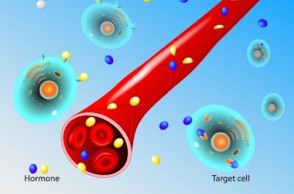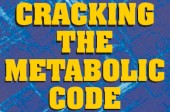Search Podcasts
Additional Info
- Segment Number 1
- Audio File wellness_for_life/1514wl5a.mp3
- Featured Speaker Magdalena Wszelaki, Certified Nutrition Coach
- Guest Website Hormones Balance
- Guest Facebook Account facebook.com/hormonesbalance
-
Guest Bio
 Magdalena Wszelaki is the founder of Hormones Balance, a nutrition coaching practice dedicated to helping women re-balance their hormones with nutritional and lifestyle changes. Magdalena is a certified nutrition coach, speaker and educator with a long history of hormonal challenges which resulted from a highly stressful life in advertising; starting from Graves’ and Hashimoto’s Disease (autoimmune conditions causing thyroid failure) to adrenal fatigue and estrogen dominance. Today she is in full remission, lives a symptom-free awesome life and teaches woman how to accomplish the same in her various online programs.
Magdalena Wszelaki is the founder of Hormones Balance, a nutrition coaching practice dedicated to helping women re-balance their hormones with nutritional and lifestyle changes. Magdalena is a certified nutrition coach, speaker and educator with a long history of hormonal challenges which resulted from a highly stressful life in advertising; starting from Graves’ and Hashimoto’s Disease (autoimmune conditions causing thyroid failure) to adrenal fatigue and estrogen dominance. Today she is in full remission, lives a symptom-free awesome life and teaches woman how to accomplish the same in her various online programs.
-
Transcription
RadioMD Presents: Wellness for Life Radio | Original Air Date: April 3, 2015
Host: Susanne Bennett, DC
Guest: Magdalena Wszelaki
This is it. The ultimate wellness show just for you. Wellness For Life Radio with Dr. Susanne Bennett.
DR. SUSANNE: Ever wonder how much of a part your hormones and endocrine system plays in your mood--in your mood and health of you as well as your partners? Right? Your partner's well-being. Now, hormones are not just about how it revs up your sex life or how it's responsible for your PMS (premenstrual symptoms). They actually play a huge role in how we function day to day.
My next guest is dedicated to helping women rebalance their hormones with nutritional and lifestyle changes. She is here to share a personal story and to guide you on how to keep your hormones in check and balance.
Welcome to the show founder of the Hormones Balance Program, Magdalena Wszelaki.
Hello, Magdalena! Welcome.
MAGDALENA: Hi. Thank you so much for having me. It's so exciting to be here.
DR. SUSANNE: I'm so happy you're here, too, Magdalena.
Now, let's get down to the basics. Please tell the listeners exactly which hormones in a woman's body do we really want to focus on?
MAGDALENA: You know, it's a great question. At the same time, you know, I like to think of the hormones like a big orchestra and everything has to like play right. It really depends on the person. I think that, you know, I see a lot in my practice and you probably see that, too. Women having thyroid problems and pooped out adrenals. Those are the biggest two issues that are going on right now. Thyroid--you know your thyroid is out of whack when you start putting on weight and no matter what you do, you just can't lose weight. Then, you have things like you start losing hair, your hair starts getting really dry, skin getting really dry. I know you've talked a lot about skin just recently. You know, you're talking about getting really fatigued no matter what you do. Losing a sense of enthusiasm for life. So, those are typical thyroid stuff. Feeling very cold. That's just thyroid really speaking. Unfortunately, a very much underdiagnosed condition in this country because of very old lab ranges that we are using and incomplete testing for thyroid that most doctors, unfortunately, do.
But, you know, the second thing that I see, it's just our society really calling for that mentality of go, go, go. It's a wonderful thing that us women, we have entered the work force and we are as ambitious as man and we've got all that freedom of doing amazing things, but I think it comes at a price sometimes, too. I do see a lot of women just suffering from adrenal exhaustion. And, here we're talking about, you know, if you're experiencing things that you just can't go to sleep at night. You're feeling wired and tired. You're feeling very light-headed when you get off the sofa. You're craving salty food or sweet food, those are some of the main symptoms of adrenal exhaustion. Yes. I see a lot of that.
DR. SUSANNE: Absolutely. I mean, there's no doubt in modern times, not only just from the fact that we're going and going and having difficulty handling the stresses and having this exhaustion issues. We're also inundated with toxins in the air, what we eat and the chemicals. These chemicals, everyone, they block the receptor sites. They block the receptor sites regarding your thyroid and your adrenals and the receptors in our brain so that all this communication between the body to the brain and the brain to the body gets all mixed up. You know, when it comes to thyroid and adrenal, I know that you've got a really great story. I'd love for you to share and talk about what was your journey in figuring out your hormone issues and now you are helping thousands and thousands of women all around the world who suffer from the same problem. Can you share a little bit about your story?
DR SUSANNE: Yes. I'll make it really short because it is a long story and one of the things, definitely, I have to say is that my story has always been very complex. You know, there are some women who just get all the clues in and resign from their jobs and get good quality sleep and they bounce back pretty quickly. Mine has just been so complicated for such a long time. In some ways, I'm grateful for that because then I think that's where the opportunity comes for anybody to kind of reframe our own problems and health challenges to really ask what can I learn from this? So, in a sense for me, it really all started, or, we tell the story from the time of diagnoses which was Grave's disease many years ago, probably about 20 years ago, which is an autoimmune condition which attacks the thyroid causing the thyroid to be hyperactive. It's no fun to feel this way because it just feels…Imagine. It's like driving a car with somebody pressing on your speed pedal and with you having no brakes. That's just how your body feels. Then, 10 years later, you know, I bounced back and instead of having Grave's, I then developed Hashimoto's Disease, which is an autoimmune disease that many women are suffering from, knowingly or unknowingly, that causes hypothyroidism. So this time, you go to the other side of the spectrum of feeling really exhausted because now your thyroid is underperforming, feeling exhausted, start losing hair and that was my story. The only thing I did not have was that I did not have weight gain because that's just not my thing, but a lot of women, obviously, suffer from that.
You know, and I like to always talk about the time from Grave's and Hashimoto's and then having adrenal exhaustion because I did work in advertising for most of my life and, you know, and I grew up in Asia and so I worked in Hong Kong and Shanghai and Singapore and, you know, it was a phenomenal life. I worked on Fortune 100 brands which are, you know, some of them are like Koenig - brands you can work on. But, that also came at a cost of working 12-14 hours, being on a plane a lot of the time. I was doing strategic planning and I was really good at it. The problem was that everybody wanted your time. You know what it is like to be good at something and everybody wants your time, right? That came at a price and that price was called adrenal exhaustion which I had no idea that I had. All I knew was that I would come home at 8:00 and by 10:00 pm, I'd be so wound up that I'd put on running shoes and go running in Shanghai for like a 10K run—a 7 mile run. Then, I would come home and would have to do a hot bath in order to calm myself down. That's how wound up I was. Then, you sleep not really deep enough and then you wake up tired. Then, you've got to 2 cups of coffee to really bring you back up again so you can function and really absorb what's going on. You know, my turning point was just a sense of fatigue, resignation, real mood swings and really feeling I was not recognizing myself any more. That was my point where I realized, you know, something is not right. I was diagnosed with Hashimoto's. Interesting, my TSH, T3, T4 numbers were all perfect, it's just my antibodies were in the thousands. Because of that, I was never put on any medication and I had to figure it out myself—how to bring those antibodies down. That is what has led me to, giving up my job, going to nutrition school, setting up my own practice and that's what I've dedicated pretty much my life to. I started off with Hashimoto's as the practice and then I extended it to all hormonal conditions. One more thing I want to add on is that, like I mentioned at the beginning. All hormones are like this beautiful orchestra and they really have to work together. What I didn't realize is that I thought I was really good. My antibodies came down. I started feeling amazing. You know, my adrenal exhaustion was…I managed to get my cortisol to a really beautiful curve. It was no more all over the place. I was not the State II fatigue any more. It was all looking good. I felt really, really good. Then, you know what? Four years ago, I started losing hair and I was like, "What is going on here?" Turns out, Susanne, I was then diagnosed with estrogen dominance, so very thankful for having a great doctor who caught. Having estrogen dominance and heavy metal toxicity which I probably got from living in China for so many years and eating pretty much from off the street all the time. You know, and that's what was causing my hair loss. So, again, embarked on the whole journey of understanding estrogen dominance. You mentioned, very rightly, the toxins that we've surrounded ourselves with, a lot of times unknowingly, whether it's coming from skin care products, the stuff that we inhale, those horrible air fresheners, which is like one of my pet peeves really. The stuff that we inhale in our offices, unfortunately, as well. All of that stuff creates a lot of estrogen and toxicity. I managed to clear that out. It took me about a year and a half to really get rid of that. You know, I have to tell you, I mean, I'm in a place in my life that I feel better, as a 42-year-old woman than I felt when I was 24.
DR. SUSANNE: Right. Right. I mean, we can all learn from your experience that everything, you have to look at it. You've got to look at it as not just your hormones. You've got to look at your lifestyle changes. As Magdalena talked about the sleep, the environment, all the chemicals.
To learn more about how you can take control of your hormones, visit Magdalena's website at DrSusanne.com/hormonesbalance. Or, as always, go to my Wellness for Life Radio show on RadioMD. - Length (mins) 10
- Waiver Received No
- Host Susanne Bennett, DC
Additional Info
- Segment Number 5
- Audio File wellness_for_life/1513wl5e.mp3
- Featured Speaker Susanne Bennett, DC
- Guest Website Dr. Susanne
- Length (mins) 10
- Waiver Received No
- Host Susanne Bennett, DC
Additional Info
- Segment Number 4
- Audio File wellness_for_life/1513wl5d.mp3
- Featured Speaker James LaValle, RPh, CCN
- Guest Website Kyolic
-
Guest Bio
 James LaValle is a nationally recognized clinical pharmacist, author, board certified clinical nutritionist, naturopathic doctorate, and founder of LaValle Metabolic Institute, an interdisciplinary medicine facility in Cincinnati where he has served thousands of patients using his metabolic model for health. He also founded Integrative Health Resources 15 years ago, which is focused as a natural products industry consulting company. James has 27 years experience integrating natural therapies into various medical and business models. James is probably best known for his expertise in natural therapeutics application and drug/nutrient depletion issues and uncovering the underlying metabolic issues that keep people from feeling healthy and vital. As such he has written hundreds of articles for a variety of industry journals and publications, and has lectured for thousands of healthcare professionals and consumer audiences globally on these topics. He was a founding author of the NHI on Demand database and spearheaded the Lexi Comp databases relating to natural therapeutics.
James LaValle is a nationally recognized clinical pharmacist, author, board certified clinical nutritionist, naturopathic doctorate, and founder of LaValle Metabolic Institute, an interdisciplinary medicine facility in Cincinnati where he has served thousands of patients using his metabolic model for health. He also founded Integrative Health Resources 15 years ago, which is focused as a natural products industry consulting company. James has 27 years experience integrating natural therapies into various medical and business models. James is probably best known for his expertise in natural therapeutics application and drug/nutrient depletion issues and uncovering the underlying metabolic issues that keep people from feeling healthy and vital. As such he has written hundreds of articles for a variety of industry journals and publications, and has lectured for thousands of healthcare professionals and consumer audiences globally on these topics. He was a founding author of the NHI on Demand database and spearheaded the Lexi Comp databases relating to natural therapeutics.
- Length (mins) 10
- Waiver Received No
- Host Susanne Bennett, DC
Additional Info
- Segment Number 3
- Audio File wellness_for_life/1513wl5c.mp3
- Featured Speaker James LaValle, RPh, CCN
- Guest Website Kyolic
-
Guest Bio
 James LaValle, is a nationally recognized clinical pharmacist, author, board certified clinical nutritionist, naturopathic doctorate, and founder of LaValle Metabolic Institute, an interdisciplinary medicine facility in Cincinnati where he has served thousands of patients using his metabolic model for health. He also founded Integrative Health Resources 15 years ago, which is focused as a natural products industry consulting company. James has 27 years experience integrating natural therapies into various medical and business models. James is probably best known for his expertise in natural therapeutics application and drug/nutrient depletion issues and uncovering the underlying metabolic issues that keep people from feeling healthy and vital. As such he has written hundreds of articles for a variety of industry journals and publications, and has lectured for thousands of healthcare professionals and consumer audiences globally on these topics. He was a founding author of the NHI on Demand database and spearheaded the Lexi Comp databases relating to natural therapeutics.
James LaValle, is a nationally recognized clinical pharmacist, author, board certified clinical nutritionist, naturopathic doctorate, and founder of LaValle Metabolic Institute, an interdisciplinary medicine facility in Cincinnati where he has served thousands of patients using his metabolic model for health. He also founded Integrative Health Resources 15 years ago, which is focused as a natural products industry consulting company. James has 27 years experience integrating natural therapies into various medical and business models. James is probably best known for his expertise in natural therapeutics application and drug/nutrient depletion issues and uncovering the underlying metabolic issues that keep people from feeling healthy and vital. As such he has written hundreds of articles for a variety of industry journals and publications, and has lectured for thousands of healthcare professionals and consumer audiences globally on these topics. He was a founding author of the NHI on Demand database and spearheaded the Lexi Comp databases relating to natural therapeutics.
- Length (mins) 10
- Waiver Received No
- Host Susanne Bennett, DC
Additional Info
- Segment Number 2
- Audio File wellness_for_life/1513wl5b.mp3
- Featured Speaker Tom Malterre, Functional Medicine Nutritionist
- Guest Website Whole Life Nutrition
- Guest Facebook Account facebook.com/wholelifenutrition
- Guest Twitter Account @TomMalterre
-
Guest Bio
 Tom Malterre is an advanced Functional Medicine trained nutritionist with over 10 years in clinical practice. He has two nutritional science degrees from Bastyr University and, along with his wife Ali, has authored three books including their most recent book, The Elimination Diet. In his free time, Tom loves to wild harvest roots, shoots, and fruits in the mountains with his five children.
Tom Malterre is an advanced Functional Medicine trained nutritionist with over 10 years in clinical practice. He has two nutritional science degrees from Bastyr University and, along with his wife Ali, has authored three books including their most recent book, The Elimination Diet. In his free time, Tom loves to wild harvest roots, shoots, and fruits in the mountains with his five children.
-
Transcription
RadioMD Presents: Wellness for Life Radio | Original Air Date: March 27, 2015
Host: Susanne Bennett, DC
Guest: Tom Malterre
You're listening to RadioMD. She's a chiropractic, holistic physician, best-selling author, international speaker, entrepreneur and talk show host. She's Dr. Susanne Bennett. It's time now for Wellness for Life Radio. Here's Dr. Susanne.
DR. SUSANNE: If you feel like you're constantly feeling tired, moody and in pain, it really may be from inflammation in your body you are not aware of. My next guest is here to share how, surprisingly enough, this is caused by the foods you eat. He will share how to eliminate certain foods from your diet so you can actually heal yourself from certain diseases.
Welcome to the show, the best-selling author of The Elimination Diet, Tom Maltere.
TOM: Thanks so much, Susanne. It's so great to be with you.
DR. SUSANNE: Absolutely. So, what made you develop this book, The Elimination Diet? And what exactly is it, in a nutshell?
TOM: Yes. Absolutely. Two different questions. What made me do it? People. You know, the reality is, you become a practitioner, you study for years and years so you can sit across from somebody, you can listen deeply and you can provide them options that will turn their life around. When I was asked, what do you want to write for a book? I said, "Oh, my gosh." I didn't hesitate. The elimination diet. I have to write about the elimination diet. I've seen so many people come in, whether it's with MS or chronic fatigue or bipolar disorder, depression, anxiety. When we get them on an elimination diet, they have more success than they've had working 10 years with multiple specialists, lots of different medications. They can turn their lives around. So, absolutely, I had to do the elimination diet.
Now, what is an elimination diet? That's a great question. What you do is, you eliminate your symptoms. You take out the foods that research and clinical practice has shown over the many decades irritate the vast majority of people. Things like gluten and dairy. We all know that people are going on these diets and you're hearing these fantastic case studies all around the globe. It's true. So what we do is, we take these foods out for a couple of weeks and then we slowly reintroduce them one by one. You wait and you see how you feel. So, if you start feeling, as we both know, that foggy thinking or that fatigue that comes back, or you get joint pain or your gut is upset or you get post-nasal drip in your sinuses or your rash comes back, then we say, "Oh! That's a suspect food." Let's take that out. We leave that food out and then we start adding other foods back in. So, you determine, over time, what it is that's behind your symptoms. You know, most people are like, "Well, I know what's behind my symptoms. It's a medication insufficiency. I should be taking more Prozac or I should be taking more anti-inflammatories or something." No. That's not what's behind your symptoms. What's causing you to have those diseases to begin with? Those disorders. What is it? What's irritating your body? I would have to say 9 times out of 10, it's the food. So, if you can just look at your food, you can remove the irritant foods from your life for a while, it's amazing. I'd have to say it's the most potent, functional medicine intervention that we've ever seen. So, if you take the foods out, you can feel better.
DR. SUSANNE: Oh, I truly believe in that elimination is really the gold standard of getting rid of your allergy symptoms and all of the other chronic symptoms that you just mentioned. I know in my book, The Seven Day Allergy Makeover, I talk a lot about our environment. You know? How what you're putting in your environment, in your home and how you're feeding your children and what type of chemicals that you're exposed to, that has a lot to do with it, too. What do you think? I mean, how much do you think environmental chemicals play a part in all of this? These chronic illnesses.
TOM: You're so ahead of the game. You know that? I mean, the reality is, we've been talking about this for a while, right? For the last decade, it's been very, very clear. The science is getting stronger and stronger and stronger. Pretty much, now, it's screaming at is to all be conscious of the fact that we can't expose ourselves to these pesticides. We can't expose to all these plastics. We can't expose ourselves to all these hand sanitizing chemicals without having adverse effects. I don't know if you saw that study, Susanne, where they were looking at parabens in triclosans. So, the hand sanitizer preservatives.
DR. SUSANNE: Oh, yeah.
TOM: They saw a 400% increase in food sensitivities when people had high levels of these chemicals in their urine. So, we have to understand that some of these chemicals change our immune cell functions. They change our microbiome, so they change how we interact with our environment. So, the higher levels of chemicals we have in our bodies, the less we tolerate proteins in our environment, including food. So, we now know these are huge constituents for why everybody's now having the peanut sensitivities and the dairy sensitivities and all sorts of different issues. So, environment is massive. It's a massive player.
DR. SUSANNE: Yes. I know. I know you hit it right on the nail, especially when it comes to the things that we deal with. I mean, there are so many chemicals that are out there. You mentioned that what it does is, it causes inflammation. It disrupts our microbiome. You know, why is the microbiome so important? I talk about the fact that it is where the largest immune cells are, the immune system, the gut-associated lymphoid tissue. Why is the microbiome the most important part?
TOM: Oh, my gosh. Because the immune system should be called the microbial interaction system. If you look at the science, clearly it shows us that the whole design of our immune system is to interact with bacterium, fungi, viruses, parasites. That's what it's there for. It's our sixth sense to determine what's out in our environment. We literally have receptor sites in our intestinal cells. These receptors that wait to be bound with little fragments from bacterium. They wait to interact with bacterial pieces. When those bacteria are present in our intestine and those little receptors are bound, it actually sends a very calming signal to the surrounding immune cells and it says, "Hey, there's nothing to see here. We've got the good guys present. No reason you to get upset about a thing." When we don't have those microbes around, the opposite happens. We actually start sending these signals that say, "You know what? If anything moves, kill it." Like, we're on edge. We don't know what's going on out there. Something's wrong. You literally have an edgy immune system and we lose something called tolerance. So, whatever you see, interesting shapes, food proteins, boom! You start launching an attack against it and we gain these food sensitivities or these food allergies.
DR. SUSANNE: You know, in your book, you talk about that people have these unintentionally triggered cross-contaminations. Of course, they don't know about it when they eat. What does that mean?
TOM: So, you know, God bless everybody for really trying hard when they go on gluten-free and dairy-free diets. It's so great the amount of effort people put in. I feel so sorry for people because they don't always get the results that they deserve. So, they think they're going on a gluten-free diet, but they're still eating processed food that's processed in a plant that has wheat in it or they go in their kitchen and their spouse has just made a big batch of wheat pancakes right next to them making their turkey hash or making some sort of salmon burgers or whatever they're doing and the flour gets on the food. Next thing you know, they still have their arthritis; they still have their irritable bowel. So, this process of what's called cross-contamination where the wheat or the dairy or the corn gets into your food supply without you knowing, is incredibly, incredibly common. So, what we try and do is teach people how to make their own foods and then, they can guarantee that they're not going to have cross contamination. So, my wife, as you know, Ali Segerson. She's amazing at cooking. We have two cookbooks we've published together. She has the most fabulous recipes in the back of that elimination diet book you have. It's amazing.
DR. SUSANNE: I love that book.
TOM: We taught a class last night and we had a bunch of people who had no idea what they were getting into, right? Everybody left just raving saying, "Elimination diet or not, I'm cooking these recipes every day." So, you know, you can replace what's causing you harm with things that make you feel fabulous. That's what this is all about. It's not about eliminating foods. It's about eliminating your symptoms and introducing foods that are delicious.
DR. SUSANNE: So, in your book, The Elimination Diet, you go into detail about what not to eat, right? But, I want to know what can we eat? What can we eat on this diet and what I love about The Elimination Diet book also is because you've got recipes in there. Let's go ahead and give a couple of a few second on what we can eat because I can't believe time goes by so fast talking to you.
TOM: Oh, yes. Sweet tart cherry chicken. Just made it last night for the cooking class. It was one of the biggest hits. So fantastic. Put that on top of some plantain tortillas. Maybe have a side of the [garbled] and then some lacto-fermented vegetables that are just like hopping in your mouth delicious. So, yes. You can put together all these meals. We have salmon burgers. We have salmon-quinoa burgers. We've got turkey meatballs. We have all these different meals that you're not going to suffer at all. You're going to actually have a wonderful taste-bud fest in your mouth and, at the same time, feel fabulous.
DR. SUSANNE: Can't wait. You know what, Tom? Thank you so much. You and Ali are such great people. So happy to have you on the show and grateful for all that you're doing to help people feel better.
Everyone, go to WholeLife Nutrition.net.
Until next time, this is Dr. Susanne sharing my natural strategies to ultimate health and wellness right here on RadioMD.
Stay well. - Length (mins) 10
- Waiver Received No
- Host Susanne Bennett, DC
Additional Info
- Segment Number 1
- Audio File wellness_for_life/1513wl5a.mp3
- Featured Speaker Tom Malterre
- Guest Website Whole Life Nutrition
- Guest Facebook Account facebook.com/wholelifenutrition
- Guest Twitter Account @TomMalterre
-
Guest Bio
 Tom Malterre is an advanced Functional Medicine trained nutritionist with over 10 years in clinical practice. He has two nutritional science degrees from Bastyr University and, along with his wife Ali, has authored three books including their most recent book, The Elimination Diet. In his free time, Tom loves to wild harvest roots, shoots, and fruits in the mountains with his five children.
Tom Malterre is an advanced Functional Medicine trained nutritionist with over 10 years in clinical practice. He has two nutritional science degrees from Bastyr University and, along with his wife Ali, has authored three books including their most recent book, The Elimination Diet. In his free time, Tom loves to wild harvest roots, shoots, and fruits in the mountains with his five children.
- Length (mins) 10
- Waiver Received No
- Host Susanne Bennett, DC
Additional Info
- Segment Number 5
- Audio File wellness_for_life/1512wl5e.mp3
- Featured Speaker Susanne Bennett, DC
- Length (mins) 10
- Waiver Received No
- Host Susanne Bennett, DC
Additional Info
- Segment Number 4
- Audio File wellness_for_life/1512wl5d.mp3
- Featured Speaker Jill Weisenberger, MS, RDN, CDE, FAND
- Organization Jill Weisenberger
-
Guest Bio

Jill Weisenberger makes nutrition science understandable, realistic and oh so delicious. She has been on a two-decade mission to empower people to grab control of their health. She does more than teach. When working with individuals and groups, Jill acts as their coach, cheerleader and strategist.
As a speaker and writer, Jill’s informative and entertaining while offering practical advice to eat better, feel better and live better. She inspires individuals, audiences and readers to take action and get results. She is contributing editor for Environmental Nutrition and also writes for many other publications including Diabetic Living, Kid’s Eat Right, The DX and Today’s Dietitian. Jill is also the author of three books.
Uniquely combining her food, nutrition and health expertise with her public relations and communications skills, Jill works with industry clients including Daisy
Brand Cottage Cheese, Boar’s Head Provisions, the Wheat Foods Council and the Alliance for Potato Research and Education. She is an internationally recognized nutrition and diabetes expert and is frequently quoted in print and broadcast media. Additionally, Jill has been honored by being named Fellow of the Academy of Nutrition and Dietetics (FAND). - Length (mins) 10
- Waiver Received No
- Host Susanne Bennett, DC
Additional Info
- Segment Number 3
- Audio File wellness_for_life/1512wl5c.mp3
- Featured Speaker Mac Gambill
- Guest Website Nudge Yourself
-
Guest Bio
 Mac Gambill co-founder and CEO of Nudge, is an entrepreneur who has experience in the technology and fitness industries. Hailing from a background in semi-professional sports and technology, Mac decided to found Nudge in order to help people lead healthier lives. The health tech company offers insight into individuals’ lifestyle choices by curating and analyzing data from health and fitness apps and wearables and providing a simple and unified feedback system to users. In his time with Nudge, the company has been recognized as finalists in programs such as RVA Companies to Watch and the Chattanooga Technology Council's Early Innovator Award. Previously to Nudge, Mac worked at a sports training facility and was recognized by the CIT as one of the entrepreneurs most likely to build the next generation of tech companies in Virginia. He currently resides in Richmond, Virginia.
Mac Gambill co-founder and CEO of Nudge, is an entrepreneur who has experience in the technology and fitness industries. Hailing from a background in semi-professional sports and technology, Mac decided to found Nudge in order to help people lead healthier lives. The health tech company offers insight into individuals’ lifestyle choices by curating and analyzing data from health and fitness apps and wearables and providing a simple and unified feedback system to users. In his time with Nudge, the company has been recognized as finalists in programs such as RVA Companies to Watch and the Chattanooga Technology Council's Early Innovator Award. Previously to Nudge, Mac worked at a sports training facility and was recognized by the CIT as one of the entrepreneurs most likely to build the next generation of tech companies in Virginia. He currently resides in Richmond, Virginia.
- Length (mins) 10
- Waiver Received No
- Host Susanne Bennett, DC
Additional Info
- Segment Number 2
- Audio File wellness_for_life/1512wl5b.mp3
- Featured Speaker Orlando M. Gutiérrez, MD
- Guest Website Kidney Fund
- Guest Twitter Account @kidneyfund
-
Guest Bio
 Orlando M. Gutiérrez, M.D., M.M.Sc., obtained his medical degree from the University of Toledo College of Medicine in 2002. He then completed internship and residency training at the Massachusetts General Hospital in Boston from 2002 to 2005, and a clinical and research fellowship in nephrology from the Brigham and Women’s Hospital/Massachusetts General Hospital Joint Nephrology Training Program in 2008. With the support of an American Kidney Fund Clinical Scientist in Nephrology Fellowship award, he completed a Masters in Medical Science degree in human clinical investigation from Harvard Medical School during his fellowship, graduating as the valedictorian of his class. Dr. Gutiérrez joined the faculty of the Division of Nephrology and Hypertension at the University of Miami Miller School of Medicine as an Assistant Professor of Medicine in 2008. He was then recruited to the University of Alabama at Birmingham in 2011, where he is currently an Assistant Professor of Medicine in the School of Medicine and an Assistant Professor of Epidemiology in the School of Public Health. In addition, he serves as the section head for outcomes and epidemiology research in the Division of Nephrology at UAB.
Orlando M. Gutiérrez, M.D., M.M.Sc., obtained his medical degree from the University of Toledo College of Medicine in 2002. He then completed internship and residency training at the Massachusetts General Hospital in Boston from 2002 to 2005, and a clinical and research fellowship in nephrology from the Brigham and Women’s Hospital/Massachusetts General Hospital Joint Nephrology Training Program in 2008. With the support of an American Kidney Fund Clinical Scientist in Nephrology Fellowship award, he completed a Masters in Medical Science degree in human clinical investigation from Harvard Medical School during his fellowship, graduating as the valedictorian of his class. Dr. Gutiérrez joined the faculty of the Division of Nephrology and Hypertension at the University of Miami Miller School of Medicine as an Assistant Professor of Medicine in 2008. He was then recruited to the University of Alabama at Birmingham in 2011, where he is currently an Assistant Professor of Medicine in the School of Medicine and an Assistant Professor of Epidemiology in the School of Public Health. In addition, he serves as the section head for outcomes and epidemiology research in the Division of Nephrology at UAB.
Dr. Gutiérrez’s research is focused on understanding pathophysiological mechanisms underlying disorders of phosphorus and vitamin D metabolism in health and in individuals with kidney disease. He has a special interest in delineating environmental and/or behavioral factors that may modulate these associations, particularly those related to poverty and nutrition. His research has been published in high-impact journals such as the New England Journal of Medicine and Circulation, and he has been an invited speaker in numerous national and international conferences. He is currently supported by a Mentored Patient-Oriented Research Career Development Award (K23) from the NIH. - Length (mins) 10
- Waiver Received No
- Host Susanne Bennett, DC









